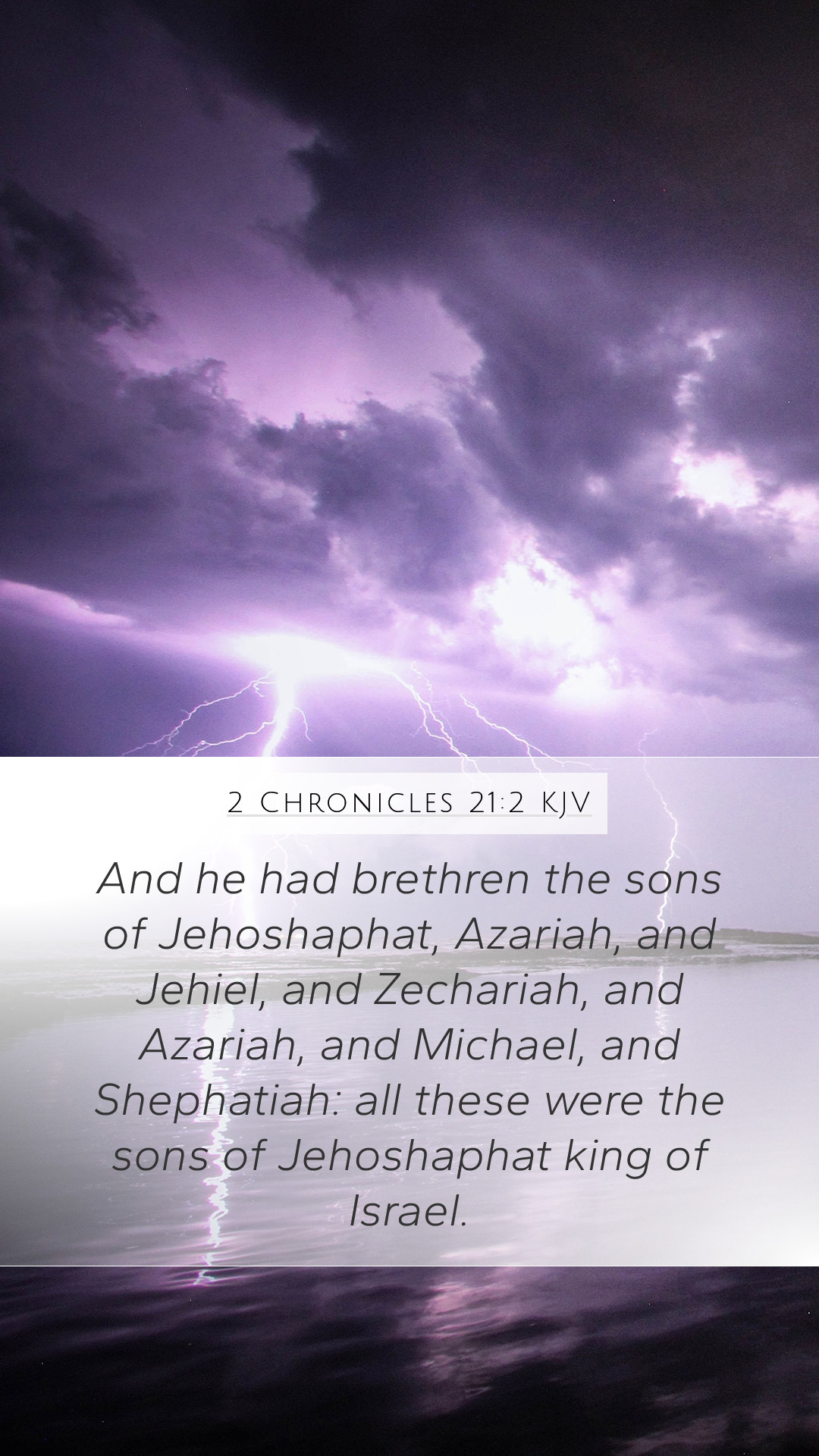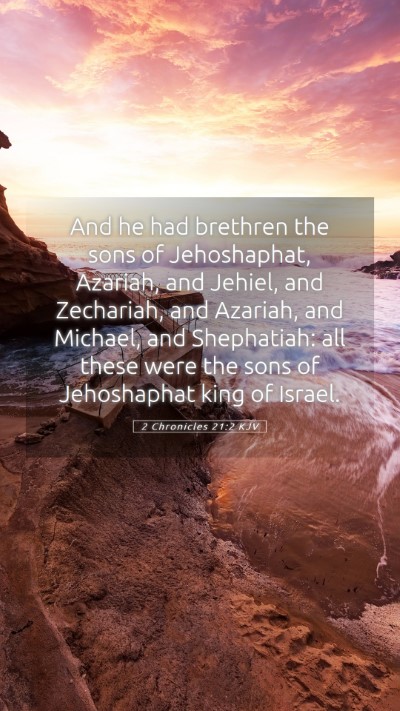Understanding 2 Chronicles 21:2: A Bible Verse Commentary
In 2 Chronicles 21:2, we find a pivotal moment in the history of Judah, reflecting the spiritual legacy passed down from King Jehoshaphat to his son, Jehoram. This verse states,
"And he had brothers, the sons of Jehoshaphat: Azariah, Jehiuel, and Zechariah, and all these were the sons of Jehoshaphat king of Israel."
To truly grasp the meaning of this Bible verse, we will explore insights from various public domain commentaries including those by Matthew Henry, Albert Barnes, and Adam Clarke.
Contextual Background
The historical context of this verse is crucial. King Jehoshaphat of Judah was known for his religious reforms and efforts to promote the worship of Yahweh. When Jehoshaphat passed, his son Jehoram took the throne amidst a landscape of familial rivalry and potential strife.
Key Elements of the Verse
- Lineage and Heritage: The mention of Jehoram's brothers emphasizes the importance of family in the biblical narrative. As noted by Matthew Henry, this verse illustrates how the leadership of the nation and its subsequent falling away directly correlates with the familial legacy.
- Spiritual Significance: Albert Barnes highlights how the characters of the brothers serve as a reflection of Jehoram's capabilities as a ruler. Their names, rich in spiritual meaning, suggest a strong foundation which contrasts sharply with Jehoram's actions during his reign.
- Political Dynamics: Adam Clarke notes that the familial connections could lead to intrigue and rivalry, which are common themes in the annals of Israel's history. The subtitle of this verse captures these underlying tensions that marked Jehoram's ascension to the throne.
Insights from Commentaries
Matthew Henry: In his commentary, Henry stresses the legacy of Jehoshaphat and the stark contrast between his faithfulness to God and Jehoram's later idolatry, suggesting that the virtues of the father often frame the struggles of the son.
Albert Barnes: Barnes provides a critical analysis of the familial structure presented in the verse. He argues that the prominence of Jehoram's brothers highlights the expectations placed on Jehoram as the eldest and the resulting spiritual decline during his reign, affirming the notion that blessings in leadership come from following God.
Adam Clarke: Clarke focuses on the repercussions of Jehoram's actions which lay in contrast to his brothers' potential to lead. He interprets their presence in the narrative as a reminder of the path that could have been taken had Jehoram adhered to the righteous path exemplified by Jehoshaphat.
Theological Themes
- Transmission of Faith: This verse serves as a reminder of the importance of passing on faith and godly practices from one generation to another, a theme prevalent in Scripture.
- The Importance of Leadership: The implications of this verse extend to conversations about leadership and influence in the community, reflecting on how leaders shape the spiritual trajectory of those they lead.
- Accountability in Legacy: The verse prompts readers to consider the weight of legacy and accountability, particularly in leadership roles, as they have far-reaching implications.
Application of the Verse
When applying the insights from 2 Chronicles 21:2, individuals can reflect on their own familial and spiritual legacies. It invites a personal examination of how one's life choices may impact future generations. The contrast between Jehoshaphat’s faithfulness and Jehoram’s eventual failings serves as a strong warning against straying from God’s commands.
Cross References
- 2 Kings 8:16-24: Discusses the reign and actions of Jehoram, providing context to the behavior noted in Chronicles.
- 2 Chronicles 17:1-6: Chronicles the reign of Jehoshaphat and the reforms he initiated.
- 1 Kings 22:41-50: Offers additional information about the kings of Judah, including their legacies.
Conclusion
2 Chronicles 21:2 is a powerful reminder of the impact of a parental legacy and the potential of family dynamics in the biblical narrative. This verse encourages deeper study into the interrelationships within biblical texts, offering a wellspring for personal reflection and group discussions in Bible study groups.
Understanding this verse not only enriches one’s knowledge of Scripture but also provides actionable insights on how to interpret Bible verses meaningfully in the context of our lives today. For more profound understanding, readers can engage in online Bible study, utilize Bible study tools, and participate in Bible study lessons that explore the intricate layers of biblical narratives.


